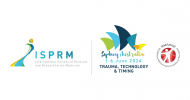Session outline
It is well-established that people with and without disabilities require sufficient physical activity for disease prevention and the promotion of good health. A range of national and international health authorities, including the World Health Organisation and the Australian Government, recommend 150 minutes of moderate intensity aerobic activity per week and strengthening activities for major muscle groups on two days of the week. There is increasing evidence that maintenance of a physically active lifestyle can enhance a range of clinical outcomes for people living with disability. However, outside the clinical setting, people with disabilities face a range of barriers to participation in physical activity that is safe, effective and enjoyable. Clinicians can play an important role in overcoming these barriers.
The aims of this workshop will be to:
-
- Give rehabilitation clinicians a framework for using physical activity and sport within their management plans, and how these change across the lifespan.
-
- Understand the organisational structure of the sport, fitness and recreation industry for people with disabilities
-
- Understand how to manage the risks associated with para-sport
-
- Understand the benefits of para-sport at a health system and societal level. For example:
- impact on length of inpatient stay
- reducing complications like deconditioning and frailty
- creating role models
-
- expediting social return on investment
- Understand the benefits of para-sport at a health system and societal level. For example:
-
- Generate interest and enthusiasm for a para-sport special interest group (SIG) for rehabilitation clinicians
Learning outcomes
-
- Understand when and how to introduce physical activity and sport to rehabilitation patients
- Appreciate the implications of sport experience (ie those that have never played sport through to athletes)
- Differentiate between approaches across the lifespan (ie from paediatrics to adults)
-
- Consider physical activity in a wide context by looking beyond traditional sports
- Understand when and how to introduce physical activity and sport to rehabilitation patients
-
- Understand the impact of the patient’s ability, disability and clinical features on selecting a sport (eg pressure area considerations; previous sport interest)
-
- Understand the risks of para-sport and ways to mitigate them. Particular considerations will include:
- Risk for the patient due to the impairment (ie injuries and complications)
- Medicolegal risk for the doctor
-
- Balance the above with the risk of not including physical activity and sports in a rehabilitation plan.
- Understand the risks of para-sport and ways to mitigate them. Particular considerations will include:
Target audience
-
- Medical practitioners (both hospital-based and community-based)
-
- Allied health (both hospital-based and community-based)
-
- Health executives
-
- Disability workers



